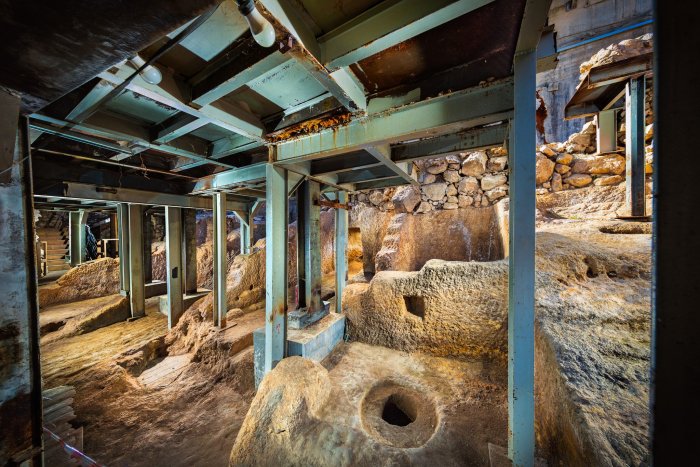Jan Bartek - AncientPages.com - A remarkable archaeological discovery by the Israel Antiquities Authority has unveiled a unique structure on the eastern slope of the City of David within Jerusalem Walls National Park.
This structure, dating back to the First Temple period, consists of eight rock-hewn rooms and includes features such as an altar, a standing stone (masseba), an oil press, and a winepress. Detailed in a recent article in the scientific journal ‘Atiqot by excavation director Eli Shukron, it is suggested that this site was used for cultic or religious practices by Judah's residents while the Temple stood nearby on the Temple Mount.
The ritual structure discovered in the City of David—the only one of its kind from this period found in Jerusalem. Credit: Kobi Harati, City of David.
Covering approximately 220 square meters, this exceptional find is notable for being one of very few ritual structures discovered in Jerusalem or elsewhere in Israel from this era. Each room within this complex contains distinct installations: an oil press for producing oil, a winepress for making wine, and carved features like drainage channels identified as altars.
An oil press and a winepress nearby: used for producing small quantities of oil and wine for ritual purposes. Credit: Kobi Harati, City of David.
A large standing stone indicates potential ritual activities conducted there. One room also exhibits mysterious V-shaped carvings on its floor; according to Shukron, these may have supported a tripod used during rituals.
Archaeologists discovered a collection of objects dating back to the eighth century B.C. in a small cave on the edge of the structure. This cache included cooking pots, jars with fragments of ancient Hebrew inscriptions, loom weights, scarabs, stamped seals featuring decorative motifs, and grinding stones for crushing grains. According to Shukron, this structure was believed to be actively used until the 8th century B.C. This timeframe coincides with the middle period when the Kings of Judah reigned.
A carved installation identified as an altar, with a channel for liquid drainage. Credit: Kobi Harati, City of David.
"The structure ceased to function during the 8th century BC., possibly as part of King Hezekiah’s religious reform. According to the Bible, Hezekiah sought to centralize worship at the Temple in Jerusalem, abolishing the ritual sites scattered across the kingdom.
A collection of artifacts uncovered in a cave adjacent to the structure: "The cave served as a repository for artifacts." Credit: Eli Shukron.
The Bible describes how, during the First Temple period, additional ritual sites operated outside the Temple, and two kings of Judah—Hezekiah and Josiah—implemented reforms to eliminate these sites and concentrate worship at the Temple," Shukron said in a press statement.
Archaeologist Eli Shukron—author of the article and director of the excavation on behalf of the Israel Antiquities Authority in the City of David. Credit: Asaf Peri, City of David.
"When we began excavating the City of David in 2010, we discovered that the site had been sealed with fill from the 8th century BCE, indicating it had fallen out of use during that time,” says Shukron. “The standing stone we uncovered remained upright in its original place, and the other rooms in the structure were also well-preserved," he added.
A scarab seal from the 8th century BCE uncovered during the excavation. Credit: Vladimir Naikhin, Israel Antiquities Authority.
The standing stone uncovered during the excavation: "The most significant and dramatic find revealed." Credit: Vladimir Naikhin, Israel Antiquities Authority.
Illustration of the carved rooms discovered in the City of David. Illustration: Shalom Kveller, City of David.
Israel Antiquities Authority excavations at the rare structure in the City of David. Credit: Vladimir Naikhin, Israel Antiquities Authority.
The current excavation, which commenced in 2010, builds on earlier discoveries made in 1909 when Montague Parker, a British adventurer, first uncovered the northern part of the structure while searching for the Ark of the Covenant and Temple treasures in Jerusalem. Shukron's excavation efforts have progressed over multiple seasons since then.
See also: More Archaeology News
"This unique structure uncovered in the City of David is an exciting testimony to Jerusalem's rich past. Such discoveries make our connection and historic roots – going back thousands of years – tangible, in Jerusalem and other sites where the Jewish culture and belief system emerged," Amichai Eliyahu, Israel's Minister of Heritage, said.
Written by Jan Bartek - AncientPages.com Staff Writer








